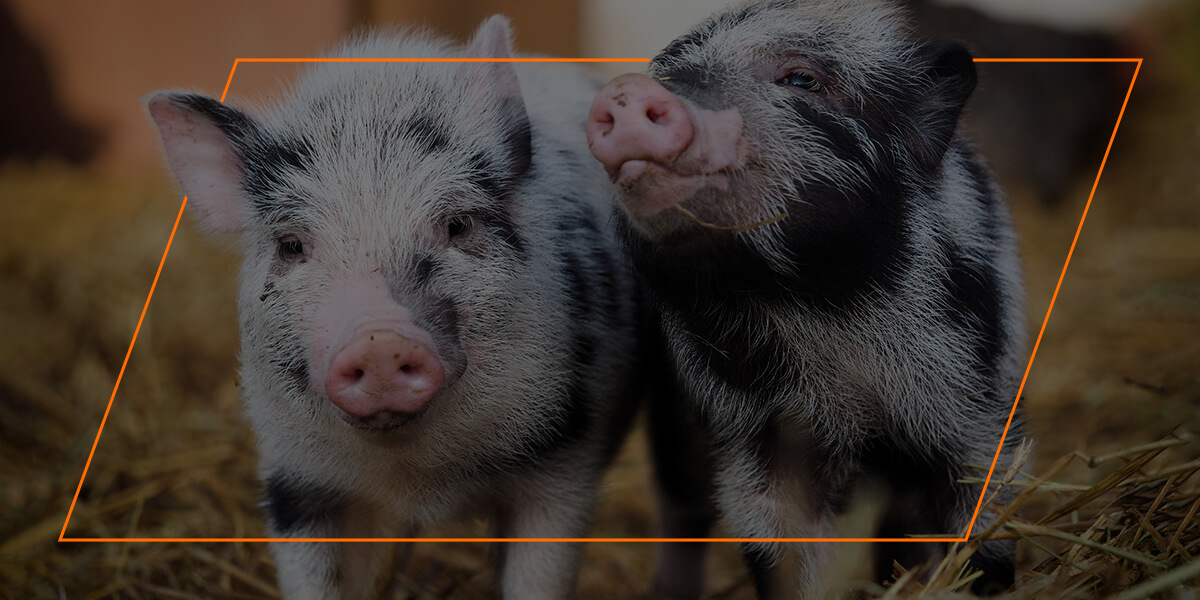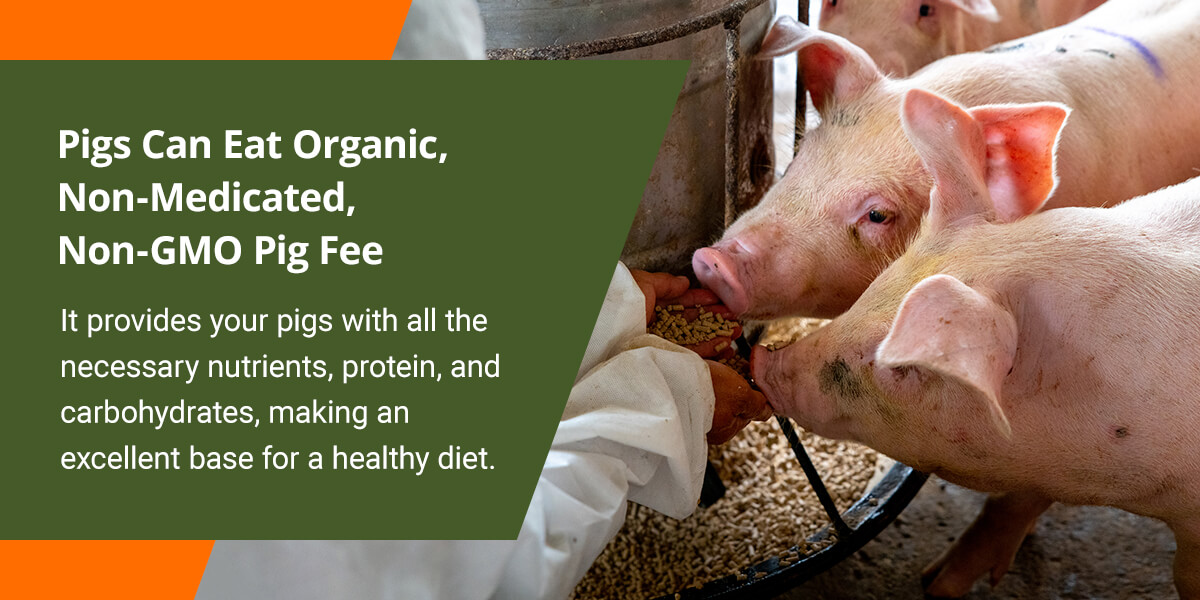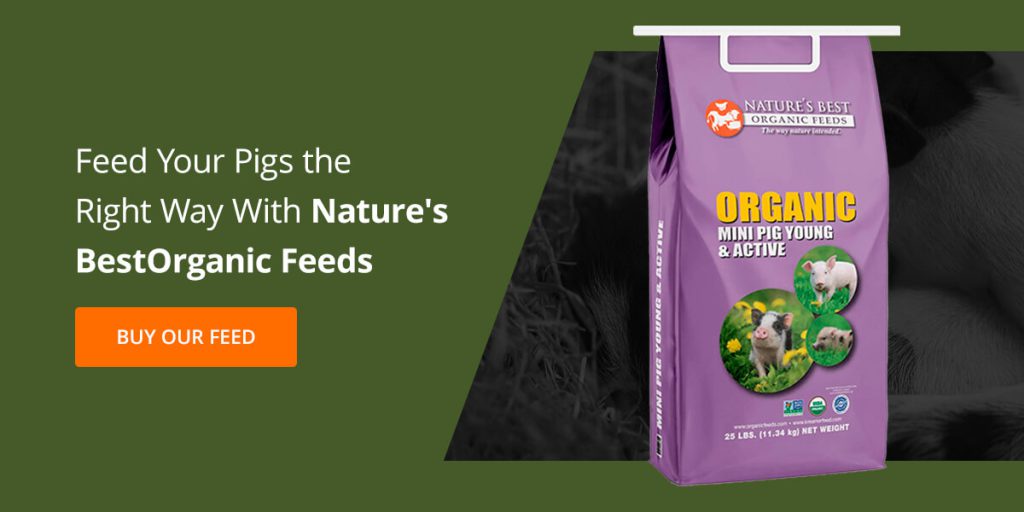
What Pigs Can and Can’t Eat
We’ve all heard the phrase, “eats like a pig.” Pigs are notorious for being able to eat anything, from the scraps off your dinner table to food that’s past its sell-by date. In truth, it’s a common misconception that you can feed your pigs whatever you have lying around the house. Incorrect feeding can cause severe illnesses and even death.
Knowing what pigs can eat and what’s poisonous to pigs is essential to keep them happy and healthy. If you’re feeding your pigs a well-rounded diet, having a list of what pigs can and can’t eat is helpful.
Can Pigs Eat Anything?
Despite their reputation, pigs can’t just eat anything. In fact, pigs have similar digestive needs to human beings in some ways — just like us, what they eat can affect their overall health and well-being.
Pigs are natural foragers and use their distinctive snouts to rummage around their environments in search of their next meal. They’re omnivores with simple and efficient digestive systems, allowing them to eat a wide range of foods. However, some foods are poisonous to pigs and should always be avoided.
What Pigs Can’t Eat
Keep this list of items pigs can’t eat handy so you don’t unintentionally feed them something harmful. Some of the most common foods to avoid include the following:
Pigs Can’t Eat Onions
Even a tiny amount of onion is toxic, and cooking them doesn’t remove the adverse effects they have on pigs. Onion can cause vomiting, blue gums, trouble breathing, and diarrhea in pigs — the first signs of toxicity that can lead to anemia and other complications.
Pigs Shouldn’t Eat Raw Meat
While some people give their pigs raw meat, there are two good reasons to avoid it.
Just like in humans, raw meat can infect your pigs with trichinosis — a worm that can be passed on to humans if they eat undercooked pork. Trichinosis infection can cause gastrointestinal distress, muscle pains, fever, and facial swelling.
In their natural environment, pigs would come into contact with and eat uncooked meat. They can develop a taste for it, which could lead to some undesirable consequences, especially if you keep your pigs near other animals.
Pigs Shouldn’t Eat Raw Eggs
The occasional raw egg shouldn’t be a problem for your pigs, but feeding raw eggs in large volumes can result in a biotin deficiency. Cooking the eggs removes the avidin that impacts biotin absorption in your pigs.
Pigs Shouldn’t Eat Celery, Parsnips, and Parsley
These vegetables and herbs may seem nutritious, but they contain furocoumarins, which cause photosensitization in the skin. Eating celery, parsnips, and parsley can make pigs more susceptible to sunburn, making these items especially risky for pigs with pink skin.
Pigs Can’t Eat Cherry Pits
Cherry fruit alone is fine for pigs to eat, but any other part of a cherry tree, including the pits of cherries and tree leaves, can result in cyanide poisoning, which can be fatal.
Pigs Can’t Eat Rotten, Rancid, or Moldy Food
Although pigs have a reputation for being able to handle rotten foods, they can get sick from eating these items, just like humans. Rotten and moldy foods contain pathogens that are harmful to pigs. They’re particularly prone to mycotoxin poisoning from eating mold.
Pigs Can’t Eat Junk Food
Junk food often contains high volumes of salt. Pigs need salt in moderation, but too much can cause salt poisoning, symptoms of which include dehydration, digestive problems, seizures, and blindness. Additionally, never feed pigs chocolate, as the theobromine can cause several health problems and even be fatal. The darker the chocolate, the more harmful it can be to your pigs.
What Is Poisonous to Pigs?
In addition to what you feed your pigs, they could find potentially dangerous foods in their environment. There are many potential toxins in the environment, so be sure to learn what grows naturally in your area and be on the lookout for potentially harmful plants. Some of the many environmental toxins harmful to pigs include the following:
- Bracken
- Laburnum
- Hemlock
- Deadly nightshade
- Cocklebur
- Rhododendron
- Foxglove
- Ragwort
- Ivy
- Henbane
- Jimsonweed
What Pigs Can Eat
A pig’s diet may be more complex than you imagined, but these animals can still enjoy plenty of food. Keep your pigs’ diets exciting and nutritious with the following foods:
Pigs Can Eat Organic, Non-Medicated, Non-GMO Pig Feed

Pig feed mix is economical, efficient, and formulated to support pig health at every phase of their lives. It provides your pigs with all the necessary nutrients, protein, and carbohydrates, making an excellent base for a healthy diet.
Pigs Can Eat Apples and Bananas
Apples and bananas make fantastic treats for your pigs. They’re sweet and nutritious — most pigs love them as a snack.
Apples are an excellent source of fiber, but be careful when preparing them, as large amounts of apple seeds can be toxic. Cut around the seeds when you prepare them as best you can.
Although they can eat bananas with the peel on, doing so increases the risk of choking and has little nutritional value. It’s best to peel bananas before giving them to your pigs.
Pigs Can Eat Meat
As mentioned above, pigs are omnivores. In their natural environment, they forage in the ground and eat a variety of insects, meats, and vegetables. Always ensure you cook the meat properly before giving it to your pigs.
Pigs Can Eat Eggs
Eggs are one of the best protein sources, and cooked eggs make an excellent addition to your pig’s diet. Hard boil your eggs in batches, wait for them to cool, and feed them to your pigs with the shell on.
Pigs Can Eat Dairy Products
Pigs love dairy, and feeding them dairy as part of a balanced diet is perfectly safe. Dairy products are a great source of protein and a special treat for your pigs.
Pigs Can Eat Tomatoes
While pigs can eat tomatoes, you must take care when feeding these to your pigs. Tomato plants contain solanine, which is toxic in large amounts. Ensure you only provide your pigs with ripe tomatoes, without leaves, vines, or other parts of the tomato plant. Avoid green tomatoes for the same reason.
Feed Your Pigs the Right Way With Nature’s Best Organic Feeds
You want to ensure your pigs get the best possible food, as their diet affects their mood, health, and energy levels. Nature’s Best Organic Feeds offers nutritious, non-medicated, and non-GMO Project verified pig feed, from feed for young and active pigs to quality adult pig pellets, to ensure your pigs get the nutrients they need from the best sources.
Find a store near you and start feeding your pigs the right way today.
